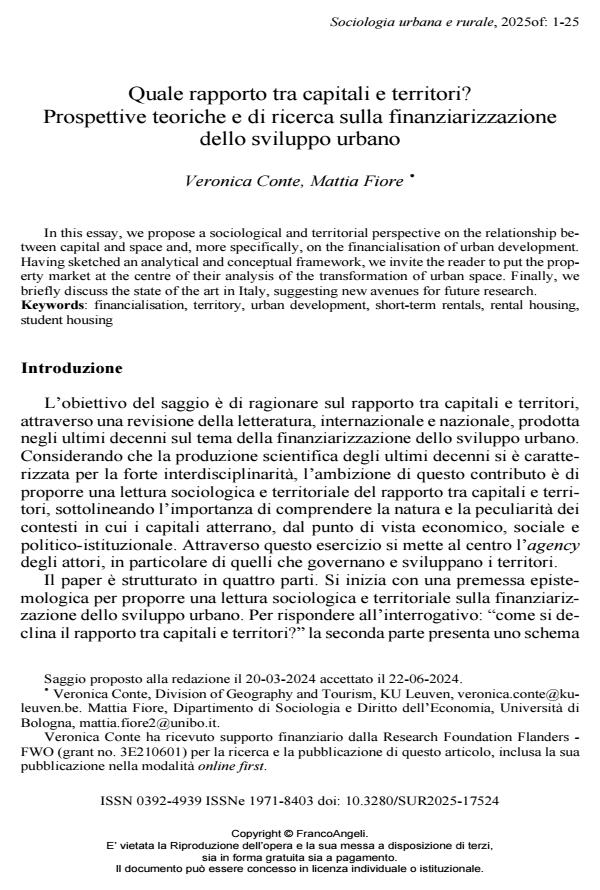Quale rapporto tra capitali e territori? Prospettive teoriche e di ricerca sulla finanziarizzazione dello sviluppo urbano
Titolo Rivista SOCIOLOGIA URBANA E RURALE
Autori/Curatori Veronica Conte, Mattia Fiore
Pubblicazione Online First 16/01/2025 Fascicolo 2025/137
Lingua Italiano Numero pagine 25 P. 1-25 Dimensione file 202 KB
DOI 10.3280/SUR2025-17524
Il DOI è il codice a barre della proprietà intellettuale: per saperne di più
clicca qui

FrancoAngeli è membro della Publishers International Linking Association, Inc (PILA)associazione indipendente e non profit per facilitare (attraverso i servizi tecnologici implementati da CrossRef.org) l’accesso degli studiosi ai contenuti digitali nelle pubblicazioni professionali e scientifiche
In this essay, we propose a sociological and territorial perspective on the relationship be-tween capital and space and, more specifically, on the financialisation of urban development. Having sketched an analytical and conceptual framework, we invite the reader to put the prop-erty market at the centre of their analysis of the transformation of urban space. Finally, we briefly discuss the state of the art in Italy, suggesting new avenues for future research.
Parole chiave:financialisation, territory, urban development, short-term rentals, rental housing, student housing
- Verso una geografia della finanziarizzazione urbana italiana: un inquadramento teorico Emanuele Sciuva, Caterina Ciarleglio, in RIVISTA GEOGRAFICA ITALIANA 3/2025 pp.84
DOI: 10.3280/rgioa3-2025oa21174 - Finanziarizzazione e mercati urbani in chiave di low geopolitics: considerazioni sul caso Milano Alberto Bortolotti, Matteo Bolocan Goldstein, in Geography Notebooks 3/2025
DOI: 10.7358/gn-2025-001-bobo
Veronica Conte, Mattia Fiore, Quale rapporto tra capitali e territori? Prospettive teoriche e di ricerca sulla finanziarizzazione dello sviluppo urbano in "SOCIOLOGIA URBANA E RURALE" 137/2025, pp 1-25, DOI: 10.3280/SUR2025-17524